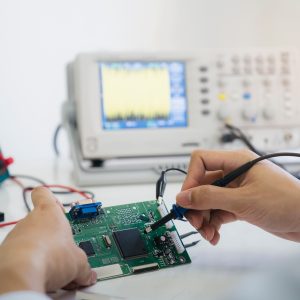Computing & Digital Technologies

Computing & Digital Technologies
BTEC Level 3 Extended Diploma in Computing
Step into the ever-evolving world of computing, where you’ll explore dynamic fields like cybersecurity and game development, unlocking a future filled with diverse and exciting career opportunities.
Is this course right for me?
To thrive in the fast-paced world of computing, you’ll need to be organised, creative, and ready to tackle challenges with logical, systematic thinking. This course is packed with exciting modules that will equip you with the skills to innovate, solve problems, and prepare for both higher education and a dynamic career in tech.
Our computing department is equipped with high-spec PCs, cutting-edge robots, and immersive VR headsets, providing you with the tools to bring your tech skills to life.
Successful completion of the Extended Diploma in year two is equivalent to three A-levels.
What are the entry requirements?
- Five GCSEs at grade C or above (may include one relevant equivalent) to include English Language/First Language Welsh and Mathematics/Numeracy
- Each application is considered on individual merit
- Entry is subject to attending a course information session or informal interview
Current student - what are the entry requirements?
- Successful completion of relevant Level 2 programme with a merit grade or above in addition to a successful decision from progression board meeting
- GCSE English Language/First Language Welsh at grade C or above
- GCSE Mathematics/Numeracy at grade C or above
What will I learn?
You will study the following units:
Principles of computer science
Computational-thinking skills are essential for roles such as software developer, cybersecurity analyst, game designer, data scientist, and other exciting careers in the computing industry.
In this unit, you will develop the computational-thinking skills to effectively analyse a problem, break it down into its component parts, and design and evaluate solutions. These skills are required for progression to computing-related higher education courses or to the workplace as a computing professional.
Fundamentals of computer systems
In this unit, you will build foundational knowledge essential for roles such as network engineer, systems architect, hardware technician, and IT consultants. You will explore the relationship between hardware and software as part of a computer system. You will examine the way computer components work both individually and together to store and process data, and the way in which data is transmitted and used in computer systems. You will explore the impact that computing systems have on organisations and individuals.
IT Systems, security and encryption
In this unit, you will investigate different types of security attack, vulnerabilities that exist and techniques that can be used to defend IT systems. You will learn about configuring complex networks to be secure while providing a safe environment with sharing and security of data including encryption. You will plan and apply suitable protection to an IT system and test it to ensure the protection is effective along with configuring a system’s access control settings.This knowledge opens the door to exciting careers such as cybersecurity analyst, ethical hacker, network security engineer, and information security consultant, roles that are critical in today’s digital world.
Business applications of social media
You will explore different social media websites, the ways in which they can be used and the potential pitfalls when using them for organisational purposes. You will develop and implement a plan to use social media strategies within an organisation to achieve its specific business aims and objectives through posting content and interacting with others.
Digital graphics and animation
In this unit, you will cover the principles of digital graphics and animation while exploring the implications of representing graphics in digital form and the processes and techniques used to develop effective digital graphics and animation. You will design, create, test and review digital graphics and animations for inclusion in a digital product.
Mobile apps development
In this unit, you will investigate mobile apps, how they are used, why they are created, the differences between devices and the implications of creating and using software on mobile devices. You will study the design considerations inherent in mobile apps and general software design with the physical design, development, testing and reviewing of a mobile app to fulfil a specific set of client requirements.
Planning and management of computer projects
In this unit, you will apply project planning and management techniques to a computing project scenario. It will provide you with the skills associated with project planning and management to include task scheduling, budgeting, risk management, time management, quality management and communication with all stakeholders throughout the life cycle of the project.
Software design and development project
In this unit, you will explore the skills necessary to design and create software. You will explore standard conventions and ways of working to create solutions to problems. You will examine a given scenario and develop effective design solutions to produce software.
The impact of computing
In this unit, you will develop an understanding of the positive and negative impacts of computing on an organisation when it implements a new system. You will consider the general impact on individuals and society as a whole, and the potential impacts of future computing developments. You will then develop a plan to implement a computing technology development in an organisation and review the plan you have developed.
Human computer interaction
In this unit, you will consider how technology has evolved to improve the communication between the device and the user. You will explore the implications of using various interfaces, by applying HCI principles to justify your decision making. You will also develop a solution to a HCI-based scenario, by using an appropriate programming language or software/hardware tools.
Computer games development
In this unit, you will investigate the technologies used in the computer gaming industry and the implications they have for users, developers and organisations. You will analyse how user needs and preferences impact on game design and how target technologies affect the design and development of a computer game. Finally, you will design, create and review a computer game to meet requirements.
Relational database development
In this unit, you will examine the structure of data, its origins and how an efficient data design follows through into an effective, useful database. You will investigate database management systems (DBMS) and apply practical skills in designing and developing a database within a given DBMS.
Computer networking
In this unit, you will learn about the major types and models of computer networks as well as the computer network hardware and software components required to design and implement networks. You will learn network communication protocols and examine communication technologies used to connect computers to wired and wireless networks. You will learn to use network design strategies to develop, implement and manage a scalable, available, efficient and secure computer network.
Work Experience
In year two of the program, you’ll get the chance to gain hands-on, real-world experience in computing through exciting work placements with local companies and organisations.
Will I need to study additional English & Maths skills?
You may need to study an additional skills course depending on:
- the course you are taking at College
- what grades you gained in your GCSE Maths and/or English Language
Click below to find out what skills course you may be taking at College.
If you are studying a Workbased qualification:
- Essential Skills Wales (ESW) in Application of Number and Communications, for Progression pathway programmes within the Built Environment Faculty only
All other courses:
- Upskilling Destination Programme – an hour and half session a week developing essential research skills, critical thinking, and academic writing techniques, supporting literacy, numeracy, digital literacy and employability skills
If you are studying a Workbased qualification:
- Essential Skills Wales (ESW) in Application of Number and Communications, for Progression pathway programmes within the Built Environment Faculty only
All other courses and those who have progressed through the internal progression route:
- A one year GCSE Resit Programme in GCSE Mathematics Intermediate Tier (Welsh or English medium) / GCSE English Language
If you are studying a Workbased qualification:
- Essential Skills Wales (ESW) in Application of Number and Communications, for Progression pathway programmes within the Built Environment Faculty only
All other courses and those who have progressed through the internal progression route:
- A one or two year pre-GCSE upskilling course in required subject/s – The priority of this programme (Foundation Maths for Mathematics pathway) is to build fundamental skill and knowledge, to prepare learners for progression onto the one-year, intermediate tier resit programme.
If you are studying a Workbased qualification:
- Essential Skills Wales (ESW) in Application of Number and Communications, for Progression pathway programmes within the Built Environment Faculty only
All other courses:
- A one year pre-GCSE upskilling course in mathematics – The priority of this programme is to build fundamental skill and knowledge, to prepare learners for progression to the Foundation Maths programme.
If you are studying a Workbased qualification:
- Essential Skills Wales (ESW) in Application of Number and Communications
All other courses:
- Upskilling Destination Programme – an hour and half session a week developing essential research skills, critical thinking, and academic writing techniques, supporting literacy, numeracy, digital literacy and employability skills
- A one year GCSE resit course in required subject/s
- Essential Skills Wales (ESW) in Application of Number and Communications, for Progression pathway programmes within the Built Environment Faculty only
For English:
- A one or two year pre-GCSE upskilling course in required subject/s
- Essential Skills Wales (ESW) in Application of Number and Communications, for Progression pathway programmes within the Built Environment Faculty only
For Maths:
- A one year GCSE resit course in required subject/s
- Essential Skills Wales (ESW) in Application of Number and Communications, for Progression pathway programmes within the Built Environment Faculty only
- A two year pre-GCSE upskilling course in required subject/s
- Essential Skills Wales (ESW) in Application of Number and Communications, for Progression pathway programmes within the Built Environment Faculty only
Learners studying on a Jobs Growth Wales (JGW+) programme will be timetabled into literacy and numeracy sessions. To discuss the opportunity of attending a GCSE resit programme, in addition to their JGW+ timetable, please contact skills@pembrokeshire.ac.uk
Can I do this course in Welsh?
Learners have the option to complete course assessment/assignments or elements of the course through the medium of Welsh or bilingually. Visit our Welsh Language in the College page to find out what else is available to you.
How will I be assessed?
- Assignment work
- Written examination
- Controlled assessment
What can I do next?
Successful completion of this course and progression to a higher level programme could lead to a number of future career opportunities including: Computer Technician, Games Developer, Web/App Developer, Database Administrator, Network Engineer, Systems Consultant, Multimedia Programmer, Animator, E-learning Developer, Technical Support, Software Tester, Cyber Security, HCI.
Following successful completion of the Level 3 programme learners can progress to a wide range of computer related Higher Education courses. Alternatively, the skills learnt from this course will allow learners to pursue an Apprenticeship pathway or seek employment as Trainee Programmers, Web/Media Designers, Computer Technicians and a wide range of other computer-related employment.
If you are thinking about studying at degree level following this course please visit the university websites or UCAS (University Central Admissions Service) www.ucas.com to check any entry requirements.
Do I need to bring/buy any equipment?
- Stationery - you will be told about any specific items before you start the course
- A memory stick/a small portable USB hard drive
- You may be eligible for funding. Find out more on our student finance page
Any costs above are approximate and may change.
Are there any additional costs?
- No tuition fee
- We are waiving the Administration Fee for the academic year 2025/26
- You may be eligible for funding. Find out more on our student finance page
Any costs above are approximate and may change.
Additional information
| Level: | |
|---|---|
| Mode: | |
| Duration: | 2 years |
Sports Academy: While on this course you may be able to join our Sports Academy, if you have a talent for sport, find out what we offer on our Sports Academy page.



